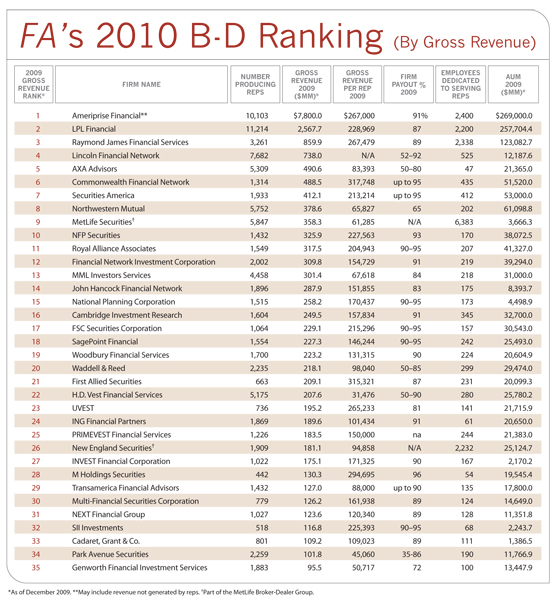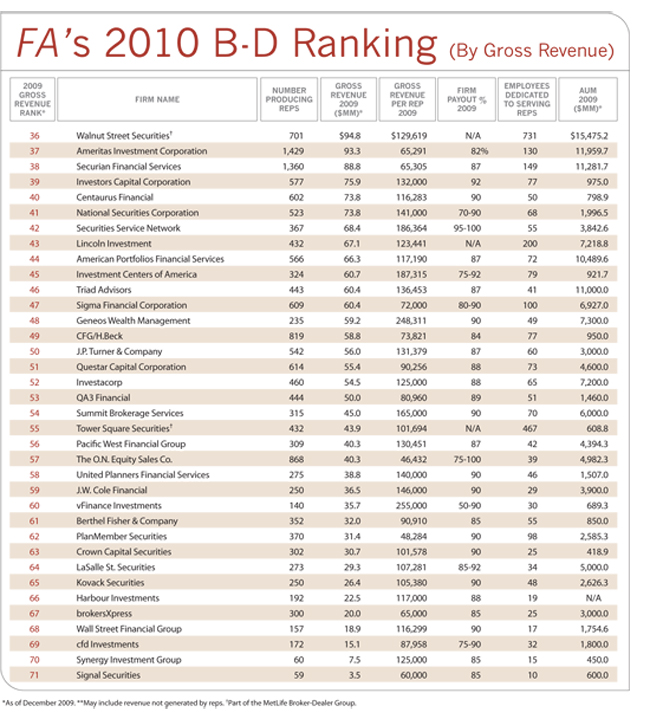Click here to view the full survey.
Every organization needs a strong brand, including broker-dealers. But in a competitive marketplace like the financial advisory space, some observers believe too many broker-dealers look alike, sound alike and don't really stand out from the crowd.
At an industry conference earlier this year, Pershing Advisor Solutions chief executive Mark Tibergien made that point to a packed meeting room. "The challenge is how do you differentiate yourselves in this marketplace," he said. "Almost every Web site paints the same picture of what a firm's about."
And then Tibergien asked attendees to ponder the existential question, "What's your competitive value proposition?"
It's a profound question, but if a firm can't answer that within two seconds, maybe they don't have a strong story to tell.
"Most broker-dealers do the same thing," says Larry Papike, president of Cross-Search, a broker placement firm in Jamul, Calif. "I think firms that differentiate themselves from the pack--and have a quality recruiting team--do a lot better than those who say 'we're the greatest in the world with service,' because anyone can sell service."
That's not to pooh-pooh service, Papike adds, because it's obviously an important part of the job description. But what's the hook that makes people want to join a particular firm?
Fee-based Solution
Papike and his daughter, Jodie, vice president at Cross-Search, named a list of broker-dealer firms that they say have strong brand recognition with the advisors they help recruit.
One of them is Cambridge Investment Research in Fairfield, Iowa. "They've distinguished themselves as the fee expert," says Jodie Papike. She notes that before it was in vogue to do fee business, Cambridge CEO Eric Schwartz replicated fee-based programs and figured out a way to make his program more cost-effective for advisors.
"Everywhere you look in their advertising and marketing and what their recruiters sell, it's always about them being fee-based experts," she says. "Because of that, anyone doing fee-based business will talk to Cambridge. And that's why they've had wonderful recruiting success."
For his part, Schwartz says Cambridge started doing fee-based business more than 20 years ago, and it now constitutes roughly 60% of the company's overall business. He says his firm's value proposition is providing a wide array of fee-based programs and having the expertise to help advisors become fee-based practices.
Cambridge's open architecture approach offers a broad array of fee-based programs at Schwab, Pershing and about 50 outside third-party managers. "Some of these areas make us less money, but we do it because it's best for our advisors."
Schwartz says the fee-based business isn't the company's sole focus, but they're "all over it" because they see themselves as having long-running expertise in that space. "It's a sideline at many of our competitors."
Cambridge's next big push is in the area of continuity and succession planning. "We looked around for something that's now an acorn, but in 20 years will be a mighty oak," Schwartz says. "I'm not the first person to realize that, but most broker-dealers haven't built a solution."
In January, Cambridge rolled out a sister company called Continuity Partners Group to provide loans that enable younger advisors to buy out senior management, or for advisory firms to acquire other practices. Twenty-four firms have signed up for the program by buying into the company. Schwartz says Cambridge hopes to add another ten to 15 firms this year.
Familiar Names
Some of the broker-dealers on the Papikes' list of top companies shouldn't be surprising.
One of them is LPL Financial, which maintains a brand identity in part through its sheer heft. But rather than conveying a consistent message about who it is, Larry Papike says, LPL's persistent advertising campaigns take a multi-pronged approach that emphasizes different aspects of its business at different times.
For example, he says LPL has long been on the leading edge of technology, but it recently tweaked that message by emphasizing how that technology can help make an advisor's office more efficient and profitable.
"They are continuing to reinvent themselves." And that helps them attract new advisors to the fold, Larry Papike says.
Another familiar--and effective--brand name is Commonwealth Financial Network. It also has created a strong value proposition through its technology offerings.
"Commonwealth has for years focused on making their technology as user-friendly as possible," says Larry Papike. "So Commonwealth can sell that to advisors looking for a technology-proficient firm."
Still another stalwart on the list is Raymond James Financial. "Obviously, they have name recognition with their advertising and their football stadium," says Jodie Papike. "They also have a very sophisticated back office with capabilities that a lot of independent firms don't have. That's because they have multiple platforms for the employee, independent and hybrid models. Because of that, they capitalized on the wirehouse reps coming to the independent platform because they have a bond desk, a bank relationship and other things independent firms don't have."
Larry Papike says that when advisors want to leave their firms and contact Cross-Search, they fill out a questionnaire that includes a question about whether they've talked to other B-D firms. Invariably, most of the above-mentioned names come up.
"These companies are always on the hot list," he says. "They advertise a lot, have robust recruiting and platforms, and they offer very strong value propositions. It's not an accident these firms are doing so well."
But of course, other firms are doing very well, too. Papike notes that Geneos Wealth Management and Summit Brokerage Services are examples of B-Ds that offer advisors ownership in the firm to make them feel like they're part of the team. "There are different ways that smaller firms can have a voice by creating something that bigger firms don't have."
First Allied Securities also scores points for creating an image as a place that helps advisors grow their business. Jodie Papike says the firm gives advisors multiple tools ranging from brochures and e-mail blasts to organizing seminars and helping fill the room with the type of client niche--such as doctors or dentists--an advisor wants to focus on. And they follow through to help the advisors close those clients.
"They are a high-net-worth lead generator," she says. "And they offer product diversification through its parent company, Advanced Equities, so they have products advisors can use as a hook to talk to sophisticated high-net-worth clients."
Different Options
Some broker-dealers have very distinctive niches.
brokersXpress is an independent broker-dealer that's a wholly-owned subsidiary of OptionsXpress, an online stock, options and futures brokerage service based in Chicago. The company has a self-designed, Web-based platform that lets people trade stocks, options and futures on one account.
"The word 'niche' . . . anyone who feels they're a niche player never really likes that word because they think it limits their market cap," says Barry Metzger, CEO of brokersXpress. "But no question, we attract people who use options."
"Options can be used in a very conservative manner and to generate income," he says. "There are multiple uses for them. We feel we do a good job educating reps and advisors to learn more about options. And we're an ideal platform for people already using complicated strategies."
Metzger says the brokersXpress model isn't for advisors who outsource their money management. Rather, it's aimed at advisors who like being hands-on asset managers.
"It takes a lot of work for advisors to differentiate themselves that way," he says. "Options are one way to do that. For us, it's a layup fit for a rep or advisor--no matter how they're trading--if they want to use options, we want them. We don't care if their book of business is $125,000 in gross dealer concessions or more than $1 million."
The parent company has three brands aimed at the advisory and money management spaces. The largest is brokersXpress, the company's independent broker-dealer. Then there's bXadvisors for RIAs, as well as bX Asset Management, a turnkey asset management program for investment advisor representatives who outsource their asset management.
Regarding brokersXpress, Metzger says it's selective when it comes to adding new advisors. The company won't write a big upfront check because he believes that's a bad business model. But it will do forgivable and nonforgivable loans.
Metzger says the company's brand connects with its intended audience. "I think we have a good name for those who trade options," he says. "They associate us with OptionsXpress. It resonates with those who do transactional business because they're getting squeezed out a little bit and looking for a place that doesn't mind doing transactional business."
But he notes the brand name faces some hurdles in the advisory world. "They don't love the name brokersXpress," he says. "That's why we created bXadvisors."
Now in its seventh year, brokersXpress has grown from 10 reps to more than 300 commission-based reps and fee-based advisors. "RIAs who've incorporated options trading are increasingly coming to us, but we've got a long way to go."
Another Alternative
Berthel Fisher & Co. in Marion, Iowa, bills itself as an alternative investment specialist. Among the products featured on its Web site's home page are direct participation programs, real estate investment trusts, tenant-in-common investments, and oil and gas programs.
"From a recruiting standpoint, higher producers seem to like having an option for alternative investments," says company CEO Thomas Berthel. "A high percentage of producers look at us specifically because we offer an array of alternative investment products."
Berthel says the company has long offered alternative products for advisors who want to use them as diversifiers in client portfolios. He says it does due diligence directly with the sponsors it works with, and invites sponsors to its regional meetings to talk about their programs with Berthel Fisher advisors.
Indeed, some alternative investments can be tricky. Take direct participation programs, for example. These are direct investments in limited partnerships and limited liability corporations in such areas as real estate, oil and gas, and equipment leasing. They enable investors to have direct participation in a venture's cash flow while providing tax benefits. But they also have illiquidity risks and offer no guarantee of a secondary market for the investment. Also, certain programs could be a blind pool where the investment isn't specifically identified.
"We specifically make sure we spend a lot of time on educating our people on alternative investments," Berthel says.
Retirement Plans
Cliff Oberlin, CEO of NRP Financial Inc. in Bryan, Ohio, has a simple elevator pitch. "We are a retirement plan-centric broker-dealer and RIA," he says.
He says 70% of his firm's business is based on retirement plans. The other 30% centers on wealth management.
"We build a lot of our tools and services around the 401(k) industry," Oberlin says. These include tools to benchmark plans for plan sponsors, as well as expense analyzers.
"Probably our strongest benefit is our network of retirement plan consultants that network at our conferences," he says.
Oberlin says NRP's ideal advisors are retirement plan producers. "That's who are attracted to us, and that's who we service."
He adds that outside recruiters sometimes call NRP to bring wealth managers on board to team up with one of its retirement plan producers who deal with corporate executives at those companies they work with.
"It can be a built-in network for wealth managers to tap," Oberlin says.
For Oberlin, NRP's straightforward value proposition helps the company stand out. "That's what you learn in business school," he says. "Find a different niche that sets you apart. And that's what we've done."
Click here to view the full survey.










